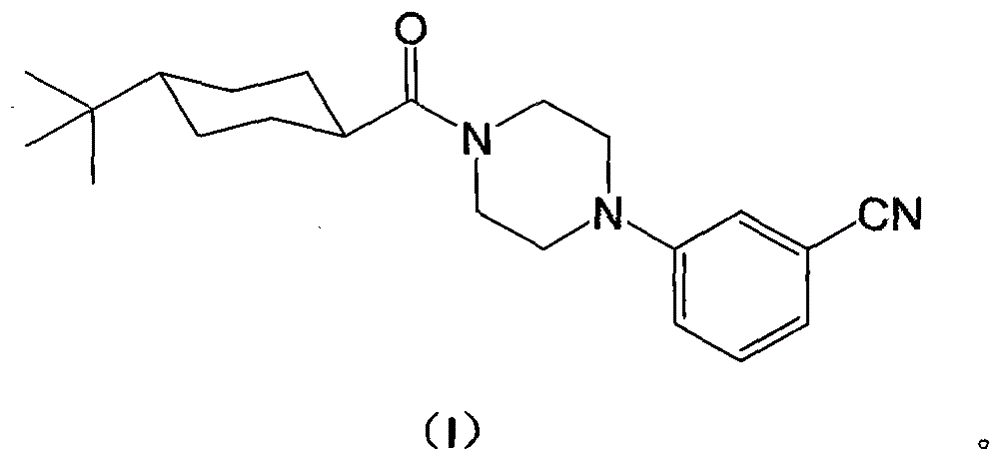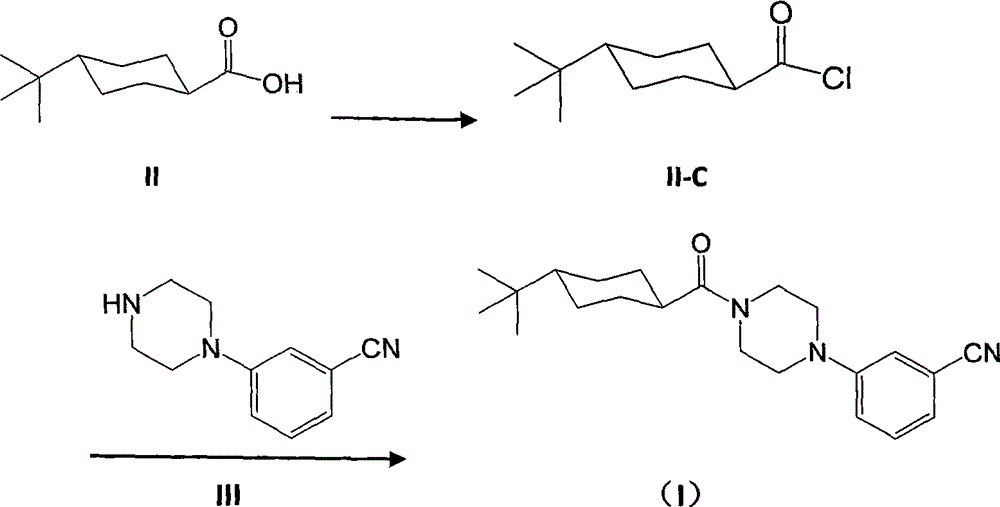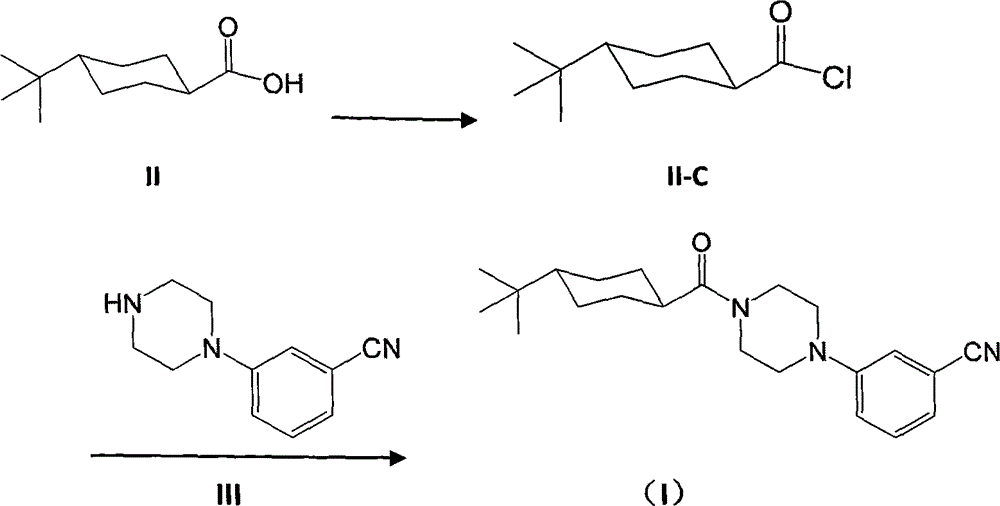Trans-cyclohexane amides containing nitrile phenyl groups and uses thereof
A technology of compounds and uses, which is applied in the field of drugs related to thrombosis diseases, and can solve problems such as high bleeding risk
- Summary
- Abstract
- Description
- Claims
- Application Information
AI Technical Summary
Problems solved by technology
Method used
Image
Examples
Embodiment 1
[0022] Embodiment 1 Preparation of Compound I of the present invention
[0023]
[0024] In a 100mL round bottom flask, add 1.84g (10mmol) compound II and 10mL redistilled SOCl 2 , and then heated to reflux for 3 hours with stirring.
[0025] The reaction mixture was evaporated under reduced pressure to remove excess SOCl 2 , the residue II-C was dissolved in 20 mL of dry dichloromethane, the resulting mixture was stirred under cooling in an ice-water bath, and slowly added dropwise from 1.87 g (10 mmol) III and 3.04 g (30 mmol) of triethylamine dissolved in 5 mL of dry dichloromethane The solution made of methyl chloride was stirred overnight at room temperature. TLC showed the reaction was complete.
[0026] The reaction mixture was poured into ice water, stirred, extracted with 50mL×3 dichloromethane, combined and extracted organic phases were washed with saturated brine, dried over anhydrous sodium sulfate, and the solvent was evaporated on a rotary evaporator, and t...
Embodiment 2
[0027] Embodiment 2 Preparation of comparative compound 1-2
[0028] In order to further compare the drug efficacy of this compound, the present invention records the following formula comparative compound I-2 (new compound, not yet disclosed) and its preparation method and pharmacological data:
[0029]
[0030] Its preparation method is as follows:
[0031]
[0032] In a 100mL round bottom flask, add 1.84g (10mmol) compound II and 10mL redistilled SOCl 2 , and then heated to reflux for 3 hours with stirring.
[0033] The reaction mixture was evaporated under reduced pressure to remove excess SOCl 2 , the residue II-C was dissolved in 20 mL of dry dichloromethane, the resulting mixture was stirred under cooling in an ice-water bath, and slowly added dropwise from 2.07 g (10 mmol) III-2 and 3.04 g (30 mmol) of triethylamine dissolved in 5 mL of dry solution in dichloromethane and continued to stir overnight at room temperature. TLC showed the reaction was complete. ...
Embodiment 3
[0035] Example 3 In vitro platelet aggregation inhibition test
[0036] Pharmacological tests of substances were performed in TRAP (thrombin receptor activating peptide)-induced platelet aggregation in 96-well plates. 3.13% sodium citrate solution was pre-added in the syringe, and then 20 mL of blood from healthy volunteers was drawn in, centrifuged at 1500 g for 20 minutes, and the platelet-rich plasma (PRP) was separated and mixed with 1 / μL PGE1 solution (500 μg / mL of ethanol solution) / mL of PRP for treatment. After incubation at room temperature for 5 minutes, they were centrifuged at 1200 g for 20 minutes to remove leukocytes. Transfer the leukocyte-free PRP to 15 mL PP tubes in batches at 5 mL / portion, and centrifuge at 3600 g to pellet the platelets. Then, decant the upper plasma layer and resuspend the platelet pellet from 5 mL of PRP in 1 mL of Tyrode (120 mM NaCl, 2.6 mM KCl, 12 mM NaHCO 3 , 0.39mM NaH 2 PO 4 , 10 mM HEPES, 0.35% BSA, 5.5 mM glucose, pH=7.4), an...
PUM
 Login to View More
Login to View More Abstract
Description
Claims
Application Information
 Login to View More
Login to View More - R&D
- Intellectual Property
- Life Sciences
- Materials
- Tech Scout
- Unparalleled Data Quality
- Higher Quality Content
- 60% Fewer Hallucinations
Browse by: Latest US Patents, China's latest patents, Technical Efficacy Thesaurus, Application Domain, Technology Topic, Popular Technical Reports.
© 2025 PatSnap. All rights reserved.Legal|Privacy policy|Modern Slavery Act Transparency Statement|Sitemap|About US| Contact US: help@patsnap.com



